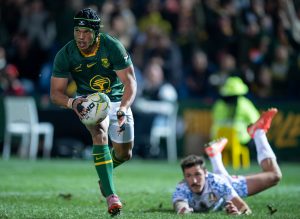Springbok coach Rassie’s first and most significant Rugby World Cup victory
Mark Keohane, in his Cape Times and IOLSPORT, weekly column says Springbok rugby is already a winner before kick-off at this year’s Rugby World Cup in Japan.
This week was a representation of when Springbok rugby finally turned the corner of transformation from which there will never be a retreat.
Springbok coach Rassie Erasmus is the first Springbok coach in South Africa’s World Cup history to announce a squad without controversy and without political fingers being pointed at the lack of black representation. He is also the first coach to have embraced the need to transform Springbok rugby from within his heart.
Numbers will always be counted when it comes to black players and Springbok selection. Erasmus has been a pioneer of breaking the shackles of prejudice when it came to the selection of black players.
He confirmed Siya Kolisi as his captain when he took over and espoused the values of Kolisi as a player. When Kolisi got injured during this year’s Super Rugby, Erasmus gave his captain every support structure to ensure he had a reasonable chance of making selection, and on the eve of Kolisi’s return to action Erasmus went public to say that all Kolisi had to do was survive the match to captain the Springboks at the World Cup.
Eben Etzebeth and Duane Vermeulen had done wonderful jobs as captains against Australia and New Zealand, respectively, but Erasmus never had to second guess who would lead the team in Japan. It was Kolisi because, in his heart, the coach believed he was the right player and the right captain. This is true transformation. Erasmus also broadened the pool of black players in the last 18 months.

When I spoke to him on his return from Ireland, where he had coached Munster, he listed his Word Cup candidates, and the emphasis was on black player game time. Erasmus had done the statistics, and they revealed how little faith his predecessors had placed in black players when it came to minutes spent on the field.
The numbers may have looked good in a larger touring squad, but when dissected, didn’t stack up to playing time numbers.
This became one of his priorities, and match squads with Erasmus this past 18 months have featured anything from seven to 12 black players in his 23.
Significantly, there have been many Tests where the number in the starting line-up has been six, seven and eight, which translates to minutes spent playing and not warming a bench.
Erasmus has since his first Test in charge shown faith in black players because he has believed in the merits of their selection.
This is where he has differed from those who have come before him, and he has crushed the stereotype of what constitutes merit.
It is no longer exclusive to white player selection. Black players lost out to black players, and white players lost out to white players and so on and so on.

For the first time since South Africa’s readmission to Rugby World Cups, a coach didn’t need to pad his squad to make up greater black representation.
Erasmus, in the past year and a half, created enough opportunities for all his players, whether they happened to be black or white, to make the final squad of 31.
A black player will captain the Springboks for the first time at a World Cup and black players will know they are at the World Cup as players and not glorified tourists.
Erasmus’s squad announcement was the first World Cup victory for the Springboks. Expect many more in the next two months.
@mark_keohaneKeohane is an award-winning sports journalist, a contributor to IOL Sport and Independent Media sport and the founder of www.keo.co.za








